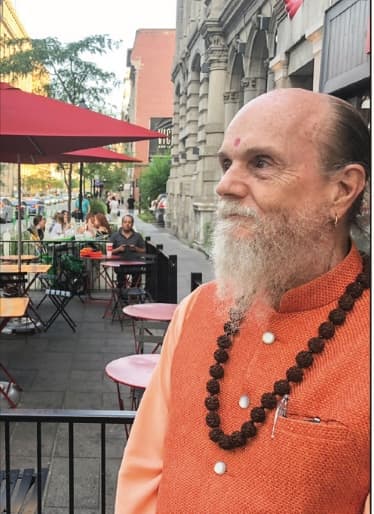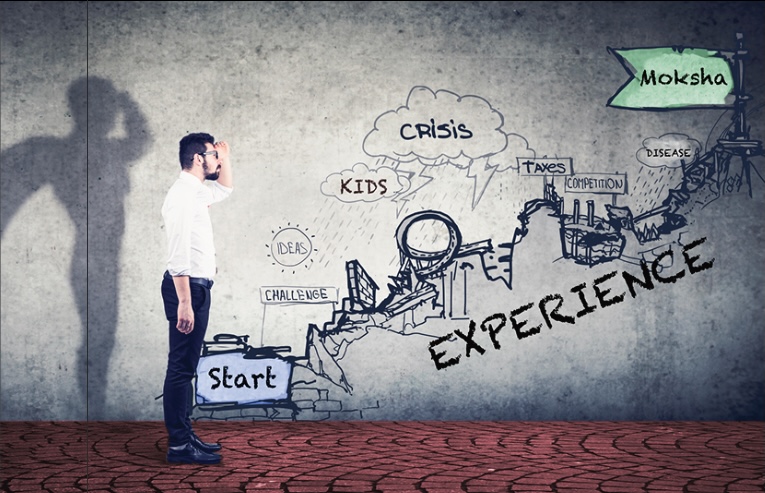We can recoil from difficulties or brave them. Here are three insights that offer hope and strength when times turn tough.
By Satguru Bodhinatha Veylanswami
Watch the video:


A common perspective regarding major challenges is that we would prefer life without them. Why would anyone want to face all these difficult times, to regularly wake up in the morning and be seriously challenged by life? My guru, Sivaya Subramuniyaswami, held a different perspective. He stated, “This is why we are born on this planet, to evolve through challenges. We are here for no other reason.“ What Gurudeva was telling us is that it is actually by living through karmas and thereby gaining better control over our instinctive and intellectual natures that we progress spiritually.
We can compare this idea to Gurudeva’s comment on being peaceful. He stated that it is fine to learn to be peaceful in a quiet place, but eventually you have to learn to be peaceful in the midst of intense activity. Likewise, we need to acquire the ability to have consistent self-control in simple, daily interactions and eventually be able to remain composed even when facing intense difficulties. If your peace cannot be disturbed in any situation, it is a permanent treasure.
Gurudeva gives a mystical insight into the secret of self-control: what we experience in the world is a reflection of what is in our mind. ”You change your own circumstances all the time, whether you know it or not. Even your mind is different today than it was a week ago. The various experiences you have brought to yourself have made it that way. The point to realize is that you can gain an intricate control of the various things that change in and about you. Lean the thoughts and feelings of your creation in the right direction, and discover how quickly your circumstances will change their direction. This is the secret of self-control. This is the practice of yoga. Try it, and lose the habit of concern, for concern is only a by-product of a part of the mind being out of control.” In other words, yogic restraint is not just getting better at handling what is happening outside of us, it is fundamentally the wise handling of our thoughts and feelings.
Staying Calm Amidst Chaos
I regularly meet with families visiting the monastery. Generally it is in the morning after they have attended the Siva puja, which is about ninety minutes long. If a family has young children, the kids have already had to sit still for a long time. So, when the they come to meet with me, their ability to sit quietly has been used up. One family had two young boys around age four and six who couldn’t stop running around the room. This embarrassed the father, who eventually confided, “You know, I used to be a lot calmer before we had children.” I told him, “Well, that’s the challenge—to be calm when you have children who are not calm.”
There’s a chapter on self-control in the ethical scripture Tirukural in the section on family dharma. One verse reads, “More imposing than a mountain is the greatness of a man who, steadfast in domestic life, has mastered self-control.” The meaning is evident. It is easy to have self-control if you are single and live by yourself, for no one is by your side to disturb you. But when you’re married, have young children and must meet professional responsibilities, self-control is much harder to achieve. The goal is to face the disturbances and still maintain calm. If you are a family person, take heart. It has been done!
Challenges Are Your Friend
Another context for dealing with challenges relates to astrological cycles of life. (Vedic astrology is a technical subject, and the example that follows is simplified.) We tend to think that astrological periods with lots of challenges are bad, and times in which conditions are smooth and conducive to success are good. That is true in the sense that it’s easier to accomplish important tasks in the world when your astrology is free of obstacles. However, astrological periods that indicate difficulties can also be viewed as good in that they present opportunities for making inner, spiritual progress through successfully facing challenges and thereby strengthening our self-control. I remember Gurudeva once said that his current astrology was so good that he had no challenges, kidding that he was “not making any spiritual progress at all.” One astrological system provides this insight: “This period is the start of a more inward journey during which you absorb and take in new information. It is also a time of real determination and giving up much superficiality in favor of indepth learning and self-discipline…. However, it can be a tedious and difficult period for worldly matters, and you are likely to be given extra responsibilities of one sort or another at this time.” When it comes to challenges, we don’t want to be overwhelmed; but, as seekers on the spiritual path, we don’t want our lives to be free of challenges either.
Worldly Experience Leads to Divine Experience
In working with a group of Hindu university students at a weekend seminar, I asked the question, “What is needed to achieve moksha, liberation from rebirth?” The answer from several students was, “You need to realize the Self.” This is certainly a correct answer, but to a thoughtful person it leads to a second question,”What, then, is needed to realize the Self?” The answer to that is not as well known: “Experience in the world, lots of it.”
In his Yoga Sutras, Sage Patanjali addresses the need for experience in the first sutra of chapter 2: “What is encountered has the character of brightness, activity and inertia. It is embodied in the elements and the sense organs. Its purpose is to provide both experience and liberation.” In other words, we are not on Earth just to go straight for liberation. We first need to learn and grow in the world’s vast ocean of events before we even begin to think about, let alone achieve, moksha. It is by encounters in the world and in learning to face those experiences in the right way—such as strengthening our self-control—that we ultimately end up seeking liberation. Experience, it turns out, is the path.
Gurudeva explores this idea in Dancing with Siva: “How Is Our Soul Different from Siva? Our soul body was created in the image and likeness of the Primal Soul, God Siva, but it differs from the Primal Soul in that it is immature. While Siva is unevolutionary perfection, we are in the process of evolving. Aum.”
His commentary on the verse delves deeper: “To understand the mysteries of the soul, we distinguish between the soul body and its essence. As a soul body, we are individual and unique, different from all others, a self-effulgent being of light which evolves and matures through an evolutionary process. This soul body is of the nature of God Siva, but is different from Siva in that it is less resplendent than the Primal Soul and still evolving, while God is unevolutionary perfection. We may liken the soul body to an acorn, which contains the mighty oak tree but is a small seed yet to develop. The soul body matures through experience, evolving through many lives into the splendor of God Siva, ultimately realizing Siva totally in nirvikalpa samadhi. Even after Self Realization is attained, the soul body continues to evolve in this and other worlds until it merges with the Primal Soul, as a drop of water merges with its source, the ocean. Yea, this is the destiny of all souls without exception.”
The point of this upadesha is that the soul body, anandamaya kosha, is maturing through experience in the world. How does this happen? It happens through gaining greater and greater control over the instinctive-intellectual nature. Doing so causes the soul body to mature sufficiently to attain realization of the Self.
Therefore, the next time you are faced with a challenge, be it major or minor, accept it as an opportunity to increase your understanding, strengthen your self-control, mature your soul body and move that much closer to realizing the transcendent Self within you.


